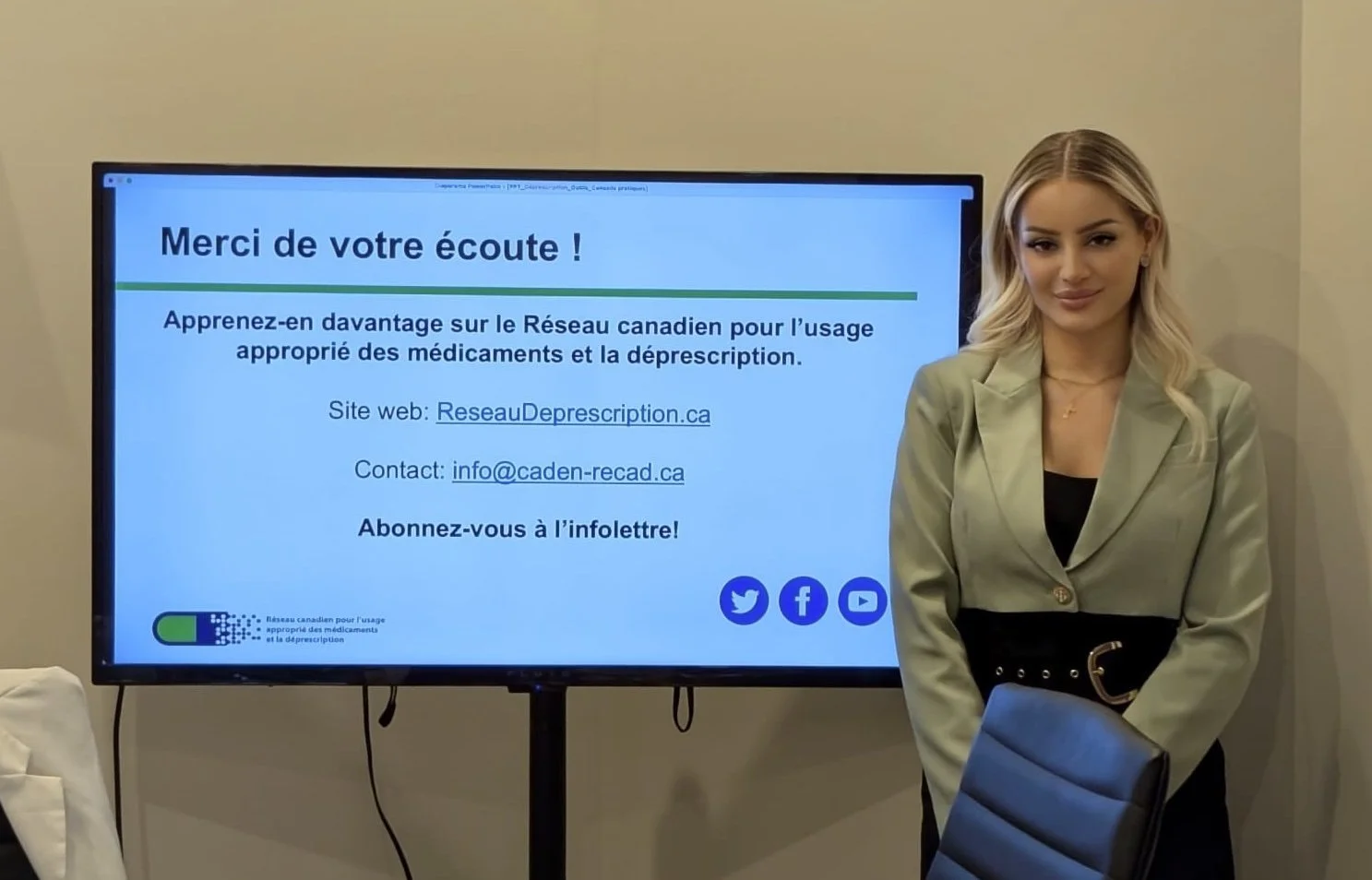STUDENTS AND INTERNS
Are you a student in medicine, pharmacy, nursing, public health, or another health field? Whether you are at the start or end of your student journey, you know by now that appropriate use of medications and deprescribing will be part of your practice.
Although your academic journey is not over, you can spark change in your study or internship environments to improve the way medications are prescribed and used!
Click on the boxes below to discover different ways to get involved as a student or intern:
Funding Opportunity for Student Activities:
The network is offering funding to students or student groups looking to plan and lead activities that raise awareness and understanding of medication appropriateness and deprescribing among their peers.
Complete an internship or lead a quality improvement project on medication appropriateness or deprescribing
Looking to complete an internship or quality improvement project on medication appropriateness and deprescribing? Whether you are in a medical clinic, hospital, community pharmacy, long-term care center, or residence for the elderly, there are plenty of opportunities available to learn and develop these skills and improve patient care.
Looking for ideas of projects you could lead? The Choosing Wisely Canada website presents toolkits describing quality improvement projects focused on improved prescribing (e.g. tackling inappropriate use of sleeping pills in hospitals or in the community).
If you are specifically looking for an internship supervisor with expertise in medication appropriateness and deprescribing research, please refer to the Research Affiliates section of our website. This page lists researchers, their organization and areas of expertise. We invite you to contact them based on your interests.
For inspiration, here is an example of an internship project on medication appropriateness and deprescribing led by students:
A pharmacy student project : Evaluation of the pharmacist’s role in a geriatric assessment clinic
Rachel Verret, pharmacy student
Rachel Verret, a pharmacy student from the Université de Montréal, led this project during the summer of 2023. She looked at clinical activities and interventions by pharmacists at the geriatric assessment clinic in Montréal, Quebec. Rachel impressively produced a scientific article and designed a poster. During this project, Rachel successfully collaborated with pharmacists, geriatricians and nurses.
A medical student project: Scoping review of the costs of adverse effects associated with gabapentinoid
Tania Morin, medical student
Tania Morin, a medical student at McGill University, is leading a research project in collaboration with network pharmacists, an internist, as well as medical and pharmacy students. She is conducting a scoping review examining the costs of adverse effects associated with gabapentinoid medications (e.g. pregabalin, gabapentin), particularly among older populations.
A pharmacy student project: Creation of a playbook on medication optimization and its impacts on the environment
Sarah Jennifer Fallis, newly graduated pharmacy student
Sarah Jennifer Fallis is a recent pharmacy graduate from the University of Waterloo Doctor of Pharmacy (PharmD) program. During her fourth-year clinical rotations, Sarah had the opportunity to work with physicians on their CPSO QI Project at St. Peter’s Hospital, which focused on medication optimization by analyzing the number of prescriptions for patients throughout their hospital stay. Sarah is now helping produce a CASCADES playbook on medication optimization and its impacts on the environment, led by Dr. Myles Sergeant and in collaboration with Choosing Wisely Canada.
Have you led a student project on medication appropriateness and deprescribing? Contact us to let us know as we would love to include it here! We can also help you find an internship and a supervisor you in your region.
Tools to discover and share
Essential resources for students and interns striving to become champions of medication appropriateness and deprescribing:
-
The AHS offers a guide of Canadian and international resources on deprescribing. An advantage of this guide is that it is divided by drug classes.
-
The Bruyère Research Institute has developed a learning module to put deprescribing and polypharmacy into practice using clinical cases.
-
Choosing Wisely Canada, a campaign aimed at the optimal use of medical examinations and treatments by reducing those deemed unnecessary, has developed various quality improvement guides for the appropriate use of medications and deprescribing. Certain classes of medications have been targeted, including proton pump inhibitors (PPIs), benzodiazepines and sedative hypnotics. These toolkits guide health professionals through the implementation of a quality improvement project.
-
Three whiteboard videos on debunking deprescribing myths, including proton pump inhibitors and sleeping pills, were developed by our Network.
-
This coalition has created a toolkit for clinicians and office managers which compiles tools and potential solutions to reduce the environmental footprint left by the use of medications, like deprescribing. Guidelines and action plans are also available for hospitals, long-term care and psychiatric care to encourage the implementation of more environmental procedures. These tools were produced in collaboration with Peach Health Ontario, a provincial initiative encouraging health system stakeholders to get involved in and become accountable of implementing environmental measures.
-
The following page presents a list of resources to facilitate the deprescription of risky or inappropriate medications in your practice.
Stay informed on the subject and the activities offered by our network:
Would you like to organize a presentation on the appropriate use of medications and deprescribing for your classmates or your internship environment?
We offer a complete Powerpoint presentation including slides with speaking notes shared on demand for free. This presentation includes evidence and clinical cases relevant to the practice of health professionals. It is available in both English and French. A modest stipend can even be offered to help organize the event!
Host and educational presentation on deprescribing
Maria Arnouk, a pharmacy student at Université Laval, organized a presentation during her internship.
Maria Arnouk, a third-year Doctor of Pharmacy student at Université Laval, organized a presentation for patients on deprescribing. The experience was very positive for her: “I had originally planned a 15-minute question period at the end of my presentation, but it lasted almost 35 minutes! I was pleasantly surprised by the interest of the patients present, who asked questions and shared some very pertinent thoughts. I'm really glad I organized this conference, even though it required a lot of preparation. I also took the opportunity to learn some valuable concepts that will enrich my future professional practice!”







